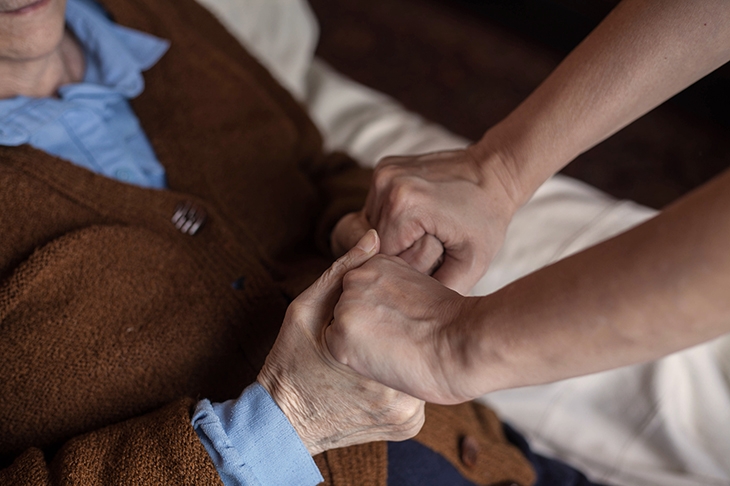My fifth week confined to barracks as nurse, chief cook and bottle washer. I drive to the supermarket about twice a week, otherwise my horizon has shrunk to a vase of cut daffodils on the kitchen table, and through the window a fluorescent orange football in the garden with the grass growing up around it, and in the field beyond furry heifers enthusiastically nosing up hay from their circular feeder.
Nevertheless I am far from unsocialised. The house is close to the centre of the village. The front door is always open — you enter via a conservatory — and there are plenty of visitors. Some of these stand at the door and diffidently call out for permission to enter, others stroll in. The doctor waltzes in like a ham Oscar-winning actress breasting wild applause on her way to the podium.
The vicar plods in as though there were not the slightest difference in her mind between the public space and the domestic. But she was a medical missionary in Papua New Guinea for more than half a century and can be easily forgiven. The postman wearing shorts who comes in to drop letters on the hall table is on autopilot, his mind elsewhere, on the vagaries of Tottenham Hotspur football club most likely. The next-door neighbour, who comes in punctually every day at four o’clock bringing freshly baked cakes, cringes on the threshold like a whipped dog until bidden to enter by myself, in person because my distant, sometimes irritated voice isn’t permission enough.
Otherwise it’s all armour-plated elderly Christian women, ranging from the deeply nominal to those ablaze with the Holy Spirit, the lot of them aged between 70 and 90. Even the mobile hairdresser, who used to go on holiday to Thailand as often as he could manage it and is most definitely not a Christian, is in his eighties.
‘And how is your mother?’ these visitors ask confidentially, sometimes on their way in, and sometimes on their way out. The latest handy metaphor with which I describe her condition is the Germanwings flight 9525 from El Prat, Barcelona, to Düsseldorf. The one where the mentally unstable co-pilot locked the captain out of the cockpit when he went to the lavatory and commenced a slow descent from 38,000ft in a straight line until it crashed into the Tête de l’Estrop in the French Alps. ‘She’s like that,’ I conclude to the rapidly blinking visitor. If pressed for further detail, I estimate that she has just entered French airspace.
Most irritatingly of all they’ll say, ‘And how long are you here for?’ with deceptive conversational brightness. Aware that I’ve been living in France, and my staying here is conditional, I’m sure that what some of them really they mean is: ‘You can’t possibly leave her in her condition, you bastard.’ One village woman, as a parting shot at the door, put it like this: ‘I am praying that you can find it in your heart, dear Jeremy, to look after your mother for as long as the good lady needs you.’ To which I bowed unctuously and enigmatically.
And so after five weeks of this I’ve begun to relish my biweekly trips to Sainsbury’s. Ours is new and of a startling postmodern design, given the backwater location. Notices in the car park trumpet ecologically sensitive features incorporated into the design that will save the planet from destruction, or immediate destruction anyway. Pushing trolleys around inside are people shopping with an air of condescension because there isn’t a Waitrose within 20 miles of this godforsaken hole. The rest look as if they are rarely to be found in such palatial surroundings, but if you can’t treat yourself now and again, what’s the point?
I’m with the ones on a beano. I now have the merchandise mapped in my mind and know exactly where I can put my hand on, say, a three-pack of Turkish Delight, which supplies about a quarter of the nourishment keeping my mother going, and on the ‘fragrance-free’ baby wipes. And my face is now a familiar one to the teenage or elderly desperados manning the checkouts, familiar enough at any rate for them to dispense with the mechanical bourgeoise form of address instilled by their training, and with the eye-contact apology for keeping me waiting for 45 seconds, not to mention the question about whether I am incapable or perhaps even too grand, which is also fine, to put the checked items into the bag myself.
And then it’s back to the kitchen — praising God that the car made it — to the cut daffodils in the vase on the kitchen table, and the abandoned orange football in the garden, and the cattle in the field beyond exuberantly nosing through their hay in the sunshine.







Comments